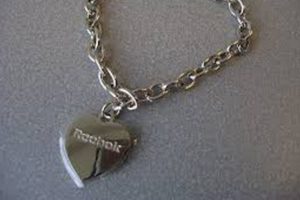
Reebok Pay 1 Million Dollar Fine For Charm Bracelet. Reebok International, Ltd.has agreed to pay a one-million-dollar fine for giving away hundreds of thousands of lead-laced charm bracelets. The bracelets killed one child, according to the Consumer Product Safety Commission (CPSC). “The penalty settles allegations that Reebok International Limited imported and distributed charm bracelets that contained toxic levels […]

Reebok Pay 1 Million Dollar Fine For Charm Bracelet. Reebok International, Ltd.has agreed to pay a one-million-dollar fine for giving away hundreds of thousands of lead-laced charm bracelets. The bracelets killed one child, according to the Consumer Product Safety Commission (CPSC). “The penalty settles allegations that Reebok International Limited imported and distributed charm bracelets that contained toxic levels of lead,” the CPSC said. The bracelets were given to shoppers for free with the purchase of children’s shoes.
In March 2006, a worldwide recall was announced for more than 500,000 of the bracelets, including 300,000 in the United States, when a four-year-old American boy died after swallowing the pendant on the jewelry. The bracelets were made in China.
The fine represents the largest that can be levied for a violation of the Federal Hazardous Substances Act (FHSA). The FHSA bans toxic levels of lead in toys and other children’s products. “This civil penalty sends a clear message that the CPSC will not allow companies to put children’s safety at risk,” CPSC chair Nancy Nord said in a statement. “Preventing dangerous metal jewelry from reaching the hands of children is a priority for our agency,” Nord said. Reebok said in a statement that it has introduced tough, mandatory product-checks since the recall. “Reebok has implemented strict, mandatory policies and procedures which ensure all gift-with-purchase and promotional items and premium products associated with our brand meet or exceed the highest quality and safety standards,” chief executive Paul Harrington said.
Nord lashed out at the toy industry and cited a lack of safety controls that led to last year’s unprecedented and highly publicized recalls when she recently spoke at the annual American International Toy Fair. Warning that the industry has the obligation to regulate itself Nord said, “I will not tolerate this industry…not complying with our regulations.” Nord added that the CPSC—which has been harshly criticized for not acting quickly enough to eliminate hazardous products from store shelves and for being influenced by the companies it regulates—is adding staff and working more closely with customs. “We all need to take responsibility” to make toys safer, she said, adding that she was “very angry” about recalls involving lead paint, as this was indicative quality control breakdown.
While the agency is now working with the Toy Industry Association to develop mandatory testing standards, millions of toys were recalled last year with 61 recalls, up over 20 from the prior year. Of those, over six million toys were recalled due to lead; the highest number ever due to product defects. Also, other potentially dangerous toys remained in stores and were sold without warning labels of possible choking hazards several times last year.
The Toy Industry Association released plans for a certification program mandating uniform testing, factory auditing, and risk assessment analysis of each product. The proposal specifies toy makers must have an accredited laboratory test a random toy selection with frequency dependent on the factory’s quality control rates. Pending federal legislation will authorize the CPSC to create such a program or designate a body to do so.
The personal injury attorneys at Parker Waichman LLP offer free, no-obligation case evaluations. For more information, fill out our online contact form or call 1-800-YOURLAWYER (1-800-968-7529).


